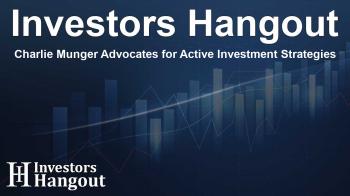Charlie Munger Advocates for Active Investment Strategies

Active Investing: A Call for Engagement
In the world of investing, few figures hold as much respect and authority as Warren Buffett and his longtime partner, Charlie Munger. Known for their wisdom and value-focused strategies, Munger recently renewed his defense of active investing in contrast to the increasing trend towards passive strategies during a discussion that harkens back to their insights during the 2001 annual meeting of Berkshire Hathaway Inc.
Munger's Insights on Wealth and Success
Diving into a profound discussion during the meeting, Munger addressed a young boy's question about investing in education. This curious 10-year-old was eager to learn about the best path for budding investors. Buffett's advice that investing in oneself is paramount resonated deeply.
However, Munger brought a critical viewpoint into the conversation. He cautioned that achieving wealth solely through passive means, likened to holding onto ‘little bits of paper,’ could lead to a misleading notion of success. He expressed a belief that a truly fulfilling life encompasses more than just accumulating wealth without engaging with the complexities of investing.
The Rise of Passive Investing
Passive investing has become a dominant strategy in today's financial markets, often characterized by investing in index funds that track benchmarks like the S&P 500. This approach simplifies investing, allowing individuals to mirror market performance without active management. Though efficient, this strategy can put investors at risk of complacency if they neglect to understand the underlying assets.
The significant growth in this investment style reflects a broader market trend where passive assets continue to gain traction and popularity. With institutions endorsing index funds, there's been a noticeable shift toward these streamlined investment vehicles, transforming how investors engage with the market.
The Impact of ETFs
Exchange-Traded Funds (ETFs) have played a pivotal role in the passive investment boom. In a landmark year, inflows into ETFs reached record levels, fueling a surge in the global ETF market to a staggering $15.1 trillion in assets. This incredible growth, driven by an impressive number of new launches and widespread institutional adoption, signifies a shift in how investors are approaching the marketplace.
While the bulk of ETFs focus on tracking indices, the push for innovation has led to an increase in conversion of mutual funds into ETF formats. This has created diverse opportunities for both passive and active investors, ultimately transforming market dynamics.
Munger and Buffett's Investment Philosophy
At their core, Munger and Buffett's approach to investing emphasizes selecting high-quality businesses at appealing prices and maintaining a long-term investment outlook. Integrity and ethical conduct remain central to their investing principles, which have guided their success through various market conditions.
As the investing landscape continues to evolve, Munger's perspective serves as a reminder to remain engaged with our investments and strive for a deeper understanding beyond mere financial returns. The essence of investing should not solely rest on accumulation tactics but should encourage a more comprehensive personal and collective growth.
Frequently Asked Questions
What did Charlie Munger say about wealth accumulation?
Munger emphasized that a life spent solely accumulating wealth passively is not a fulfilled life. He advocates for engaging actively with investments.
How did Buffett respond to the young investor's question?
Buffett advised that the best investment one can make is in oneself, reinforcing the importance of personal growth.
What is passive investing?
Passive investing typically involves replicating a market index's performance through investments like index funds, aiming for ease and low maintenance.
Why are ETFs significant in modern investing?
ETFs have experienced explosive growth, offering diversified investment opportunities and reflecting changing investor preferences in the marketplace.
What principles guide Munger and Buffett's investment strategies?
They focus on high-quality businesses, long-term perspectives, integrity, and ethical behavior as foundational elements of their investing philosophy.
About Investors Hangout
Investors Hangout is a leading online stock forum for financial discussion and learning, offering a wide range of free tools and resources. It draws in traders of all levels, who exchange market knowledge, investigate trading tactics, and keep an eye on industry developments in real time. Featuring financial articles, stock message boards, quotes, charts, company profiles, and live news updates. Through cooperative learning and a wealth of informational resources, it helps users from novices creating their first portfolios to experts honing their techniques. Join Investors Hangout today: https://investorshangout.com/
Disclaimer: The content of this article is solely for general informational purposes only; it does not represent legal, financial, or investment advice. Investors Hangout does not offer financial advice; the author is not a licensed financial advisor. Consult a qualified advisor before making any financial or investment decisions based on this article. The author's interpretation of publicly available data shapes the opinions presented here; as a result, they should not be taken as advice to purchase, sell, or hold any securities mentioned or any other investments. The author does not guarantee the accuracy, completeness, or timeliness of any material, providing it "as is." Information and market conditions may change; past performance is not indicative of future outcomes. If any of the material offered here is inaccurate, please contact us for corrections.
